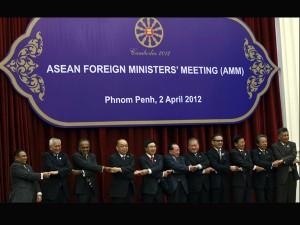
Asean Secretary General Surin Pitsuwan, far right, holds hands with Asean foreign ministers in traditional group photo session at the start of their meeting in Phnom Penh, Cambodia Monday, April 2, 2012. AP
PHNOM PENH — Southeast Asian leaders met Tuesday for an annual summit set to be dominated by Myanmar’s historic reforms, North Korea’s planned rocket launch and strategic maritime disputes with China.
Leaders of the 10-member Association of Southeast Asian Nations (Asean) convened in the Cambodian capital two days after by-elections in Myanmar saw pro-democracy leader Aung San Suu Kyi win her first seat in parliament.
Election monitors from Cambodia, which holds the Asean chair, have
declared Sunday’s vote free and fair, and urged the West to lift
sanctions imposed over the Myanmar military’s long record of rights abuses.
Asean foreign ministers applauded the “orderly” conduct of the polls
during talks in Phnom Penh on Monday, setting the stage for a strong endorsement from the bloc’s leaders at Wednesday’s conclusion of the two-day summit.
Asean secretary-general Surin Pitsuwan said the vote should contribute to the “reintegration of Myanmar into the global community”, a reference to the possible lifting of sanctions.
Myanmar’s human rights abuses and iron-fisted suppression of political dissent have often hijacked Asean gatherings in the past, much to the embarrassment of more democratic member-states.
But over the past 12 months the country’s quasi-civilian government, led by President Thein Sein, has freed hundreds of political prisoners, eased media restrictions and welcomed the opposition back to the political fold.
At the last Asean summit in November, the country was rewarded for its efforts by being promised the bloc’s chairmanship in 2014. Myanmar is eager too to win greater foreign investment with the prospect of sanctions being lifted.
Asean comprises Brunei, Cambodia, Indonesia, Laos, Malaysia, Myanmar, the Philippines, Singapore, Thailand and Vietnam — a grouping of
nearly 600 million people from disparate economic and political
systems.
The bloc has often been dismissed as a talking shop but it has assumed new strategic importance in light of Washington’s foreign policy “pivot” to Asia and the economic rise of China in recent years.
North Korea’s planned rocket launch — described by Pyongyang as a bid to send a satellite into orbit but condemned by the United States and its allies as a thinly disguised missile test — is also looming over the Cambodia summit.
Philippine Foreign Secretary Albert del Rosario said the Asean foreign
ministers spoke with one voice against the nuclear-armed North’s
launch plans.
The Philippines — which lies beneath the rocket’s proposed flight path — has lodged formal protests with Pyongyang’s representatives at the United Nations, in China and at Asean.
“I think the countries that spoke on the topic… were all of the
opinion that we should be discouraging [North Korea] from undertaking that launch,” Del Rosario said after the foreign ministers’ meeting on Monday.
Regional tensions with China over disputed islands in the South China Sea are another vexing issue for the Asean leaders, diplomats said.
China has competing territorial claims in the sea with Asean members Brunei, Malaysia, the Philippines and Vietnam. The United States says it has a “national interest” in keeping the vital trade route open to shipping.
The sea is a conduit for more than one-third of the world’s maritime trade and half its traffic in oil and gas, and major petroleum deposits are believed to lie below the seabed.
US ally the Philippines has been leading a push for Asean to form a united front and present China with a binding “code of conduct” in the sea, but other members argue that Beijing should be involved from the start.
There are also differences over the “internationalisation” of the rival claims, with Cambodia insisting they are matters for quiet diplomacy between Asean and China but the Philippines asserting the primacy of international law.

